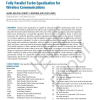Free Online Productivity Tools
i2Speak
i2Symbol
i2OCR
iTex2Img
iWeb2Print
iWeb2Shot
i2Type
iPdf2Split
iPdf2Merge
i2Bopomofo
i2Arabic
i2Style
i2Image
i2PDF
iLatex2Rtf
Sci2ools
ACCESS
2015
2015
Fully Parallel Turbo Equalization for Wireless Communications
Iterative turbo equalization is capable of achieving impressive performance gains over the conventional non-iterative equalization having the same complexity, when communicating over channels that suffer from intersymbol interference (ISI). The state-of-the-art turbo equalizers employ the logarithmic Bahl–Cocke–Jelinek–Raviv (Log-BCJR) algorithm. However, due to the specific nature of serial data processing, the Log-BCJR algorithm introduces significant processing delays at the receiver. Therefore, in low-latency applications having a high throughput, the turbo equalizer might be deemed less attractive than its conventional counterparts. In order to circumvent this problem, in this paper, we conceived a novel fully parallel turbo equalization algorithm, which is capable of significantly reducing the data processing delay and, hence, improving both the processing latency and the attainable throughput at the receiver. The fully parallel equalizer is then combined with the fully ...
Related Content
| Added | 27 Mar 2016 |
| Updated | 27 Mar 2016 |
| Type | Journal |
| Year | 2015 |
| Where | ACCESS |
| Authors | Hoang Anh Ngo, Robert G. Maunder, Lajos Hanzo |
Comments (0)

